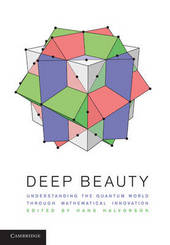
|
Deep Beauty: Understanding the Quantum World through Mathematical Innovation
Hardback
Main Details
| Title |
Deep Beauty: Understanding the Quantum World through Mathematical Innovation
|
| Authors and Contributors |
Edited by Hans Halvorson
|
| Physical Properties |
| Format:Hardback | | Pages:486 | | Dimensions(mm): Height 261,Width 185 |
|
| Category/Genre | Quantum physics |
|---|
| ISBN/Barcode |
9781107005709
|
| Classifications | Dewey:530.15 |
|---|
| Audience | | Professional & Vocational | |
|---|
| Illustrations |
15 Line drawings, unspecified
|
|
Publishing Details |
| Publisher |
Cambridge University Press
|
| Imprint |
Cambridge University Press
|
| Publication Date |
18 April 2011 |
| Publication Country |
United Kingdom
|
Description
No scientific theory has caused more puzzlement and confusion than quantum theory. Physics is supposed to help us to understand the world, but quantum theory makes it seem a very strange place. This book is about how mathematical innovation can help us gain deeper insight into the structure of the physical world. Chapters by top researchers in the mathematical foundations of physics explore new ideas, especially novel mathematical concepts at the cutting edge of future physics. These creative developments in mathematics may catalyze the advances that enable us to understand our current physical theories, especially quantum theory. The authors bring diverse perspectives, unified only by the attempt to introduce fresh concepts that will open up new vistas in our understanding of future physics.
Author Biography
Hans Halvorson is Professor of Philosophy at Princeton University. He has written extensively on the foundations of quantum physics, with articles appearing in the Journal of Mathematical Physics, the Physical Review, Philosophy of Science, and the British Journal for the Philosophy of Science, among others. He is currently working on applying the tools of category theory to questions in the foundations of mathematics. Halvorson has been the recipient of the Mellon New Directions Fellowship (2007), the Cushing Memorial Prize in the History and Philosophy of Physics (2004), Best Article of the Year by a Recent Ph.D. (Philosophy of Science Association, 2001) and Ten Best Philosophy Articles of the Year (The Philosopher's Annual, 2001 and 2002).
|